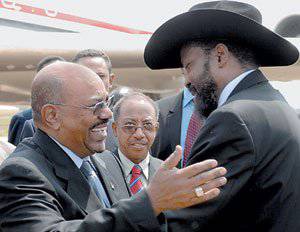North and South Sudan on the brink of war
 Official Khartoum stated that he plans to appeal to the UN Security Council with a complaint about the actions of South Sudan (established as an independent state in July 2011) about support for the rebels in Southern Kordofan and Blue Nil states. The authorities of the Republic of Sudan (RS) accuse South Sudan (Republic of South Sudan) of supplying militants from the Sudan People’s Liberation Movement - North (SNOD-C) with man-portable air defense missile and anti-tank complexes, mines, ammunition, ammunition.
Official Khartoum stated that he plans to appeal to the UN Security Council with a complaint about the actions of South Sudan (established as an independent state in July 2011) about support for the rebels in Southern Kordofan and Blue Nil states. The authorities of the Republic of Sudan (RS) accuse South Sudan (Republic of South Sudan) of supplying militants from the Sudan People’s Liberation Movement - North (SNOD-C) with man-portable air defense missile and anti-tank complexes, mines, ammunition, ammunition. In addition, Khartoum claims that according to Sudanese intelligence services, the military of South Sudan is directly involved in the battles on the side of the rebels, as well as using the commanders of Darfur troops (Darfur is a region in the west of Sudan, an area of inter-ethnic Darfur conflict) weapons and ammunition in the "rebellious states." This is not the first complaint of Khartoum to South Sudan. "Divorce" peacefully in two republics did not work.
In the state of Blue Nile, the Sudanese military won a number of victories, took the city of Al-Kurmuk, which was a stronghold of the rebels. Began to form from the local population "Blue Nile battalion", designed to help the regular army to maintain security in the state. In the state of Southern Kordofan, the situation is more difficult - there are battles with the use of artillery and armored vehicles. In this state, Khartoum also plans to rely on local tribes, creating paramilitaries to fight the rebels.
Juba (the largest city of South Sudan and the temporary capital, because the capital plans to move to Ramsel) also accuses Northern Sudan of helping insurgents - in the Republic of South Sudan there are fights with rebels who are oriented to the North. Serious clashes between South Sudanese rebels and regular units are noted in the United and Equatorial States. These areas because of these fights are on the verge of a humanitarian catastrophe due to lack of water and food. There is a threat that South Sudan could not become a full-fledged state, following the path of further fragmentation.
Too strong contradictions exist between the two republics:
- The disputed region of Abyei, is an area of over 10 thousand square kilometers, it is mainly controlled by Khartoum. Both states are building up their forces there, although the UN Security Council has given permission to enter the "blue helmets" and plan to deploy Ethiopian 2400 soldiers. Both sides are very tough, RS President Omar Hassan al-Bashir declared his readiness to fight.
- Section of oil revenues. North after the collapse of the state was left without most of the "black gold" - 75% of oil production remained in the South. But Khartoum got oil pipelines that go through RS to Port Sudan and oil refineries. Therefore, Khartoum and Juba are trying to agree on the division of revenues from oil sales. Al-Bashir believes that it is necessary to divide in half, Southerners do not agree. The authorities of South Sudan are ready to negotiate only on the lease of pipelines, to pay a transit fee.
- The problem of water resources. This is a very serious problem for this country, caused by population growth, a dry climate and regular droughts. Several states argue for the flow of the Nile River: Egypt, Sudan (now two states), Ethiopia, Eritrea, Kenya, etc.
- The problem of external debt. At the time of the collapse of Sudan - the country's external debt was more than 38 billion dollars. Khartoum is not going to incur the full amount. There were negotiations with the United States and the European Union on the cancellation of the debt. Berlin in October 2011 offered Sudan to pay its debt not in cash, but through providing German companies with a share to participate in various projects in the country. Germany's Sudan owes more than 11 billion dollars.
Information